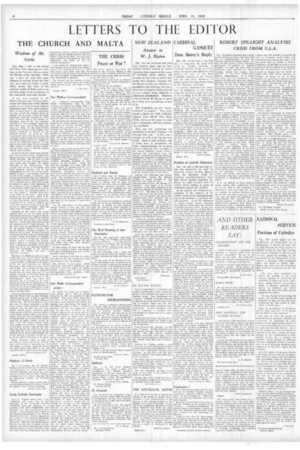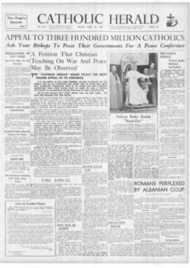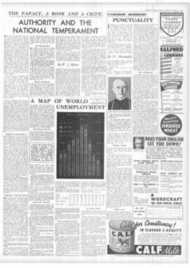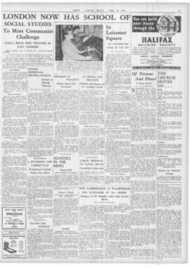Page 8, 14th April 1939
Page 8

Report an error
Noticed an error on this page?If you've noticed an error in this article please click here to report it.
Tags
Share
Related articles
English Visitors' Impressions Of Malta
Priests And The Language Of Malta
Catholic Action In Malta President's Protest
Maltese Catholic Action Dangers Of Misuse
The 'machinations' Of The Roman Curia
Wisdom of the Curia
Sin,—May I refer to the letters that have been appearing for some time in the CATHOLIC HERALD about the Maltese clergy, and that, I must say, I have not read with great pleasure on account of the fact that they have been put before a public which knows very little of the political muddle of Malta and so can but little judge of the correctness of the statements expressed therein. It has been asserted by Mr Olivieri-Munroe that "it is an unfortunate fact that many of the Maltese priests do not write or speak English sufficiently well." Yes, unfortunately,
there is much truth in that statement, but why should the Maltese clergy be singled out so much, when the same statement could be repeated of every other cultured body in the island, not excluding most of the very teachers brought over from England? Nor is the fault their own. Up to 1921 little care was ever taken by the local British authorities to impart a thoroughly satisfactory education in English to the cultured classes. So much so, that towards the end of the last century one could get a degree at the local University by taking Italian instead of English aa one of the obligatory subjects. It was only in these later years that the Colonial Office began to foster English culture and in many ways to oust the Italian culture and language.
Mr Olivieri-Munroe finds fault with the local Ecclesiastical Curia (Archbishop's House) because it stilt uses Italian as its official language. But he does not tell us that up to a little while ago Italian was, along with English, the official language of the Government. The present time is one of transition, and while political passions, not to say antagonisms, are rife, is it for the Archbishop to step in and change what has behind it the weight of centuries, just because the Colonial Office has embarked upon a policy which it did not pursue for over a hundred years, and is now trying to enforce in spite of the opposition of the majority of the population? What if the Colonial Office were to go back to the old policy, the ridiculous policy of the " pan i passu "? Will the Curia have to go back to that also? And to go further—too far, perhaps : What if Mr Chamberlain in a fit of generosity were to take Commander Kerr's suggestion published in the Centimac HERALD last week and hand the island over to the mercy of Signor Mussolini? Will the Curia have to change spots again?
Catholics in the island who speak English only are not so many as Mr Olivieri-Munroe seems to suggest. Nearly all of them belong to families of military or naval men who remain in the island only for a short while and can scarcely be considered to be local citizens. In any case, they are abundantly provided for by special Catholic churches and special Catholic chaplains assigned to them for the purpose. It is not so much on account of them that it is urgent that a more proper knowledge of English culture is needed among the educated classes, priests included, but because such a culture is becoming more and more a historical necessity, just in the same way as for the last nine hundred years the knowledge of the Italian language and culture has been a historical necessity.
The Curia in Malta, as well as everywhere else, uses for its official use the cultural language that it finds firmly and unquestionably established in the place. So in the first centuries the official language of the Church at Rome itself was Greek. As a parallel to that may be quoted the fact that in England French was the court, and more or less official, language of the land from the Norman Conquest to the time of the Plantagenets. That may seem an anomaly, but it is based on the wellknown fact that the development or the extinction of any particular language or culture is the work of long years, to say the least, and cannot be treated as if it were a Gordian knot.
It is very interesting to note that while both Mr Olivieri-Munroe and Professor Aquiline stand more or less on opposite poles to Fr. Bugeja, still they disagree considerably. Mr Olivieri-Munroe does not seem to attach importance to the Latin culture, while Professor Aquiline contends that he does not see " why priests should throw overboard their Latin culture, which is a common culture to all Catholic communities everywhere." Again, while Mr Olivieri-Munroe seems to suggest that the status of the Italian language in Malta should simply be what " the little Italian colony which may number six hundred " could make it, Professor Aquilina who, by the way, does not discuss the Curia at all, contends that the Italian language should continue to be, along with English, one of our cultural languages as long as it is not the official language of the place.
When, therefore, there is such a diversity of views even among persons who could be put on the same par in the present question, could the Curia act more wisely than stick to the old way till brighter and surer times dawn? Elmo. Re COLIC RO, D.D, London, N.W.8.
Maltese: A Patois
Si,—It is strange that Mr OlivieriMunroe should accuse me of offending my countrymen by calling Maltese a so-called language; and yet at the same time he glories in the fact that " English is being used as a ' home language ' by an increasing number of educated Maltese."
To me, Maltese is only a patois; but I should despise myself if, at home, I were to replace it by a foreign language.
HENRY BUGHIA,
Early Catholic Enterprise
Bugeja writes that I am " evidently not aware that at the beginning of the nineteenth century something more was required for a printing press than imagination and foresight, viz., the Government's permission. That permission was refused to the Maltese and granted to the Church Missionary Society." This is supposed to be a reply to the following paragraph that I wrote in the CATHOLIC HERALD of March 24: " That the Church Missionary Society was the first to obtain permission for a printing press does not mean that the Maltese clergy of the time could not have had the imagination and the
foresight to ask for e similar permission before, and give Malta the first Catholic Bible." I also wrote that " the next very good (Catholic) translation of the New Testament was made by Mr G. Muscat-Azzoppardi."
I can assure Fr. Thigeja that what I am unaware of is not that at the beginning of the nineteenth century we did not enjoy a free Press but that the Government did not permit the clergy of the time to publish a translation of the
New Testament in Maltese.
The chapter on the freedom of the Press in Dr. Laferla's history of British Malta throws much more light on the position.
J. AQUILINA.
London, S.W.&
Our Maltese Correspondent
SIR, — However well-meaning your Malta correspondent may be, his messages are likely to produce quite B. wrong impression in the minds of your readers. A Maltese cannot read what he writes without pain, and even without a suspicion that he is a man with. the superiority complex who would like to teach the Church in Malta a thing or two.
He misquotes the Archbishop's Lenten Pastoral, he refers vaguely to what has been said in Lenten sermons (such sermons are preached in a hundred churches and chapels every year): he is a man who probably knows neither Italian nor Maltese. If he knows any Latin, I recommend him to read Canons 1495-1497 of the Codex of Canon Law : there he will find the doctrine that the Maltese clergy. without exception, hold and teach, and preach if necessary also In Lent.
There is not a single statement of his last communication to you that is exact. There are eleven statements in it and as many inaccuracies or falsehoods. He begins by saying that " the recent recommendations of a committee . . . recommended extending taxation to the property of the Church." When he gets the substance of a fact right he seems unable to express himself properly. The dissentient member of the Committee (co,nposed entirely of Government offtcia/s) was more of a man than your readers were given to understand. The Archbishop did not point out in his Pastoral that the Committee's suggestion synchronised with the exclusion of the clergy from the Council of Government. Why did he not point out in whose Lenten sermon of the hundred or so preached was the inaccurate statement reported by him made? He not only knows what the clergy have never said, but he repeats like a parrot about the extent of the Church's property what was said by its enemies a good fifty years ago.
For the information of your poorly served readers I may say that the greater part of the property held by the Church in Malta is tied down to serve definite charitable ends (such as the provision of marriage dowries for poor girls related by descent to the donors of the legacy), or intended to provide a benefice for future priests, emially descendants of the makers of the wills, or for Masses to be said for the souls in Purgatory, or to defray the expenses of a particular church, and so on. All this can be vaguely termed " Church property," but the Church has not the free disposal of it. The consequence is that 95 per cent, of the Maltese clergy are dependent solely on their Mass stipend (2s. 6d.) and what they can earn through individual initiative.
" It takes longer to learn the ins and outs of a country's affairs, even though It is only small Malta, than your correspondent seems to think.
Lastly, offerings in kind are the exception and not the rule, though it is more picturesque to say the opposite.
The columns of your paper, widely read here, would by a Maltese be considered to serve the purpose of " giving reliable information " if your foreign correspondents were somewhat more accurate than this one is.
ANTONIO CALLEJA (Rev.)
Our Malta Correspondent writes :
Fr. Calleja has given me a tremendous slating, but I hope on second thoughts he will not consider it fully deserved. The good father puts into his letter all the energy and spirit of sweeping condemnation with which he attacks vice and strives for good in his difficult parish of Gzira. I submit, however, he has not understood all that he has read on Malta in the CATHOLIC HERALD, or, SO far SS my own small contributions are concerned, the objective spirit in which they were written. The commission appointed to propose ways of rehabilitating the Island's finances, referred to by Fr. Calleja in commenting upon a recent news-paragraph in the CATHOLIC HERALD, comprised two members of the Governor's Advisory Council, two Government heads of Department and the Personal Assistant to the Lieutenant-Governor; in the preamble to the report on their proposals it says that the suggestion to extend certain taxes to include Church property had been " suspended," the other proposals were to go through, as, indeed, they are now doing. The Mon. Dr. C. Mifsud Bonnici, LL.D., in a statement at the end of the report on the commission's findings, diesociated himself from the proposal to include Church property in the new taxation measures. I need not refer again to the moral aspect of the position which has been already emphasised in your columns; of course, there could never be any question of taxing Church property without the full consent and co-operation of the ecclesiastical authorities. In point of fact, however, the Church—despite the general belief that the regular orders must be wealthy because they hold much land (incidentally they are excellent landlords)—is definitely poor. It is always a struggle to find the money for repairs to the numerous splendid edifices the piety of past ages has built; I know instances of priceless art treasures rotting because money cannot be found to pack and send them abroad for treatment: priests like Fr Calleja are as poor as the Apostles, and have to work hard to earn a pittance to live upon—even this is shared with the poor and indigent who, elsewhere, are the. Government's concern. That the regular orders hold much property I the result of donations through the centuries) is surely true, but the total yield is small and is kept small, since they are not capitalists. On the other hand stipends, fees, church clues, etc., are ridiculously small, and have not risen with the depreciation in the value of money.
blog comments powered by Disqus















